Cobble Berm Monitoring Project Update: Completion of Year One
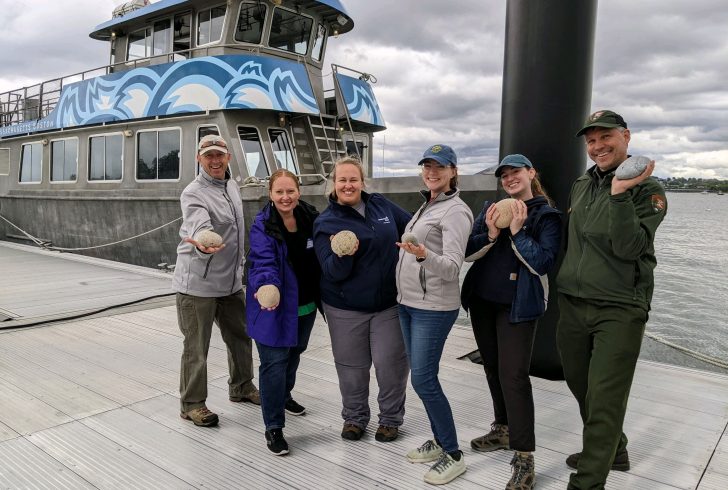

Brittany Hoffnagle, Climate Resiliency Specialist
Woods Hole Group
The first year of our Cobble Berm Monitoring Project is finished! As part of the Massachusetts Coastal Zone Management Coastal Resiliency Grant, Woods Hole Group (WHG), the Stone Living Lab (SLL), Duxbury Beach Reservation (DBR), and the MA Office of Coastal Zone Management (CZM) collaborated to develop an educational program for local stakeholders including municipality staff, conservation commissions, academic researchers, students, non-profit leaders, and consulting practitioners to learn about cobble berms and nature-based approaches.
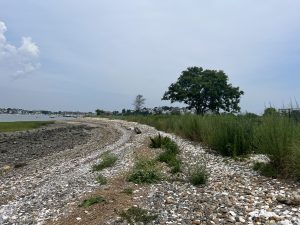
In year one we developed a small focus group and offered a series of field trips to explore and learn about existing cobble berms throughout Massachusetts. The focus group brought together 14 local municipal staff members from across the Commonwealth to share stories of the challenges in coastal resiliency efforts and brainstorm ideas and solutions for better implementation of cobble berms and nature-based approaches in coastal communities. With the guidance of this focus group, our team created and ran four informational field trips this summer to anyone interested in learning more about cobble berms.
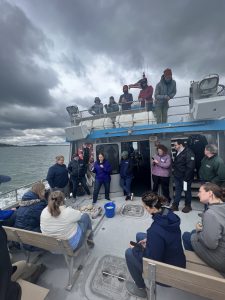 The first trip was a boat tour of the Boston Harbor Islands with 31 attendees on board the Columbia Point, the UMass Boston research vessel. While we maneuvered around the islands, Julia Knisel (CZM), Kirk Bosma (WHG), and Marc Albert (National Park Service) spoke on the history of the islands and the coastal processes affecting them, and the function of cobble berms and appropriate grainsize for successful implementation.
The first trip was a boat tour of the Boston Harbor Islands with 31 attendees on board the Columbia Point, the UMass Boston research vessel. While we maneuvered around the islands, Julia Knisel (CZM), Kirk Bosma (WHG), and Marc Albert (National Park Service) spoke on the history of the islands and the coastal processes affecting them, and the function of cobble berms and appropriate grainsize for successful implementation.
Following the boat tour, we hosted three field trip visits to existing cobble berms across the Commonwealth:
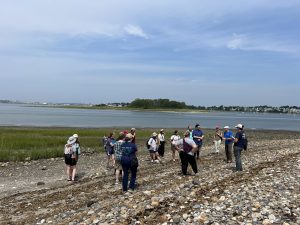
The cobble berm at Coughlin Park was implemented to help reduce the impacts of erosion along the western edge of the public park that includes tennis courts and picnic benches. Designing and constructing a cobble berm at this location in concert with maintaining existing salt marsh and rocky bottom habitat makes this cobble berm an excellent example of a hybrid cobble berm approach.
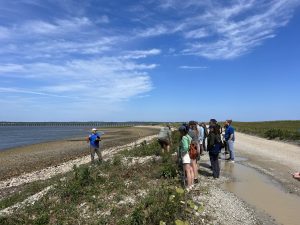 Duxbury Beach is found along a thin barrier beach system directly exposed to coastal processes like daily tides, sediment transport, and wave action and fronts the greater Duxbury Bay estuary system. Over time, the barrier beach has narrowed and has called for some creative thinking to help stabilize its coastline. In response to a landward migrating tidal creek channel, a cobble berm was placed on the back side of the barrier beach to help stabilize the shoreline.
Duxbury Beach is found along a thin barrier beach system directly exposed to coastal processes like daily tides, sediment transport, and wave action and fronts the greater Duxbury Bay estuary system. Over time, the barrier beach has narrowed and has called for some creative thinking to help stabilize its coastline. In response to a landward migrating tidal creek channel, a cobble berm was placed on the back side of the barrier beach to help stabilize the shoreline.
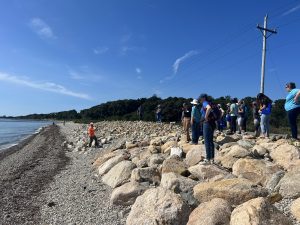 Trunk River is a small tidal creek inlet that coexists with a scenic bike path, a popular beach for Falmouth residents and visitors, and a buried sewer line that serves as the major connection between the Village of Woods Hole and Falmouth proper. Directly exposed to wave action from coastal storms and nor’easters, this area is subject to coastal erosion. The cobble berm constructed at Trunk River is adjacent to a larger built rock revetment serving as an interesting comparison for understanding the efficacy of cobble berms.
Trunk River is a small tidal creek inlet that coexists with a scenic bike path, a popular beach for Falmouth residents and visitors, and a buried sewer line that serves as the major connection between the Village of Woods Hole and Falmouth proper. Directly exposed to wave action from coastal storms and nor’easters, this area is subject to coastal erosion. The cobble berm constructed at Trunk River is adjacent to a larger built rock revetment serving as an interesting comparison for understanding the efficacy of cobble berms.
The field trips paved the way for exploring the different cobble berms and their intended use at each unique location. They also provided practitioners the opportunity to ask questions to the experts and learn about how to monitor cobble berm success over time. Additionally, and maybe most importantly, these efforts allowed attendees to connect with peers across the Commonwealth who may be facing similar coastal resiliency challenges. We will continue to nurture this growing network of people who can provide valuable insight on the successes of implementing cobble berms and other nature-based approaches.
In total, 78 unique individuals representing 41 different organizations across the Commonwealth took part in some component of year one of this CZM grant project. We are excited and look forward to developing this program further by planning more field trips and the potential for creating more in-depth workshops about the function and implementation of cobble berms.
Stay tuned for the latest updates as we plan year two!